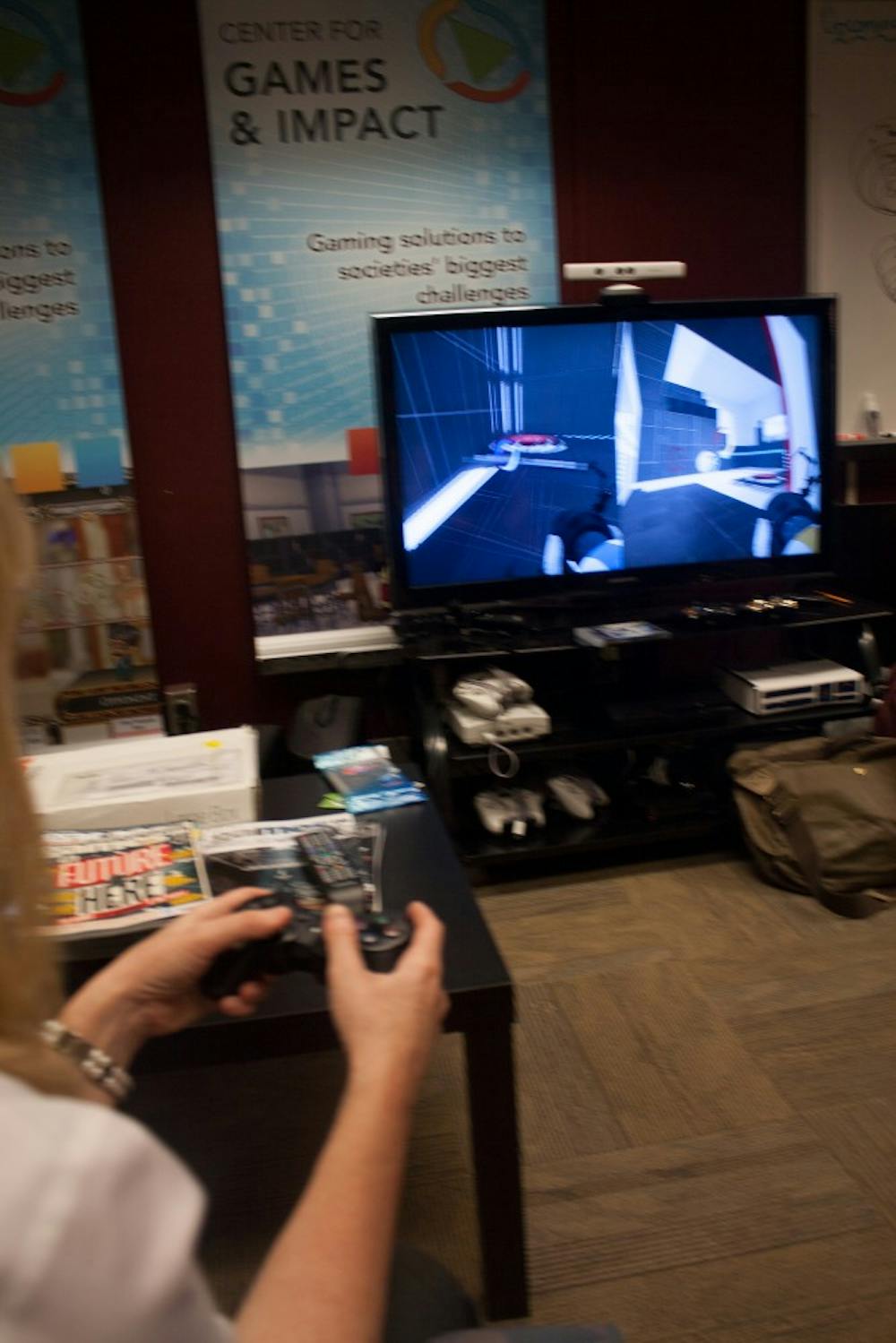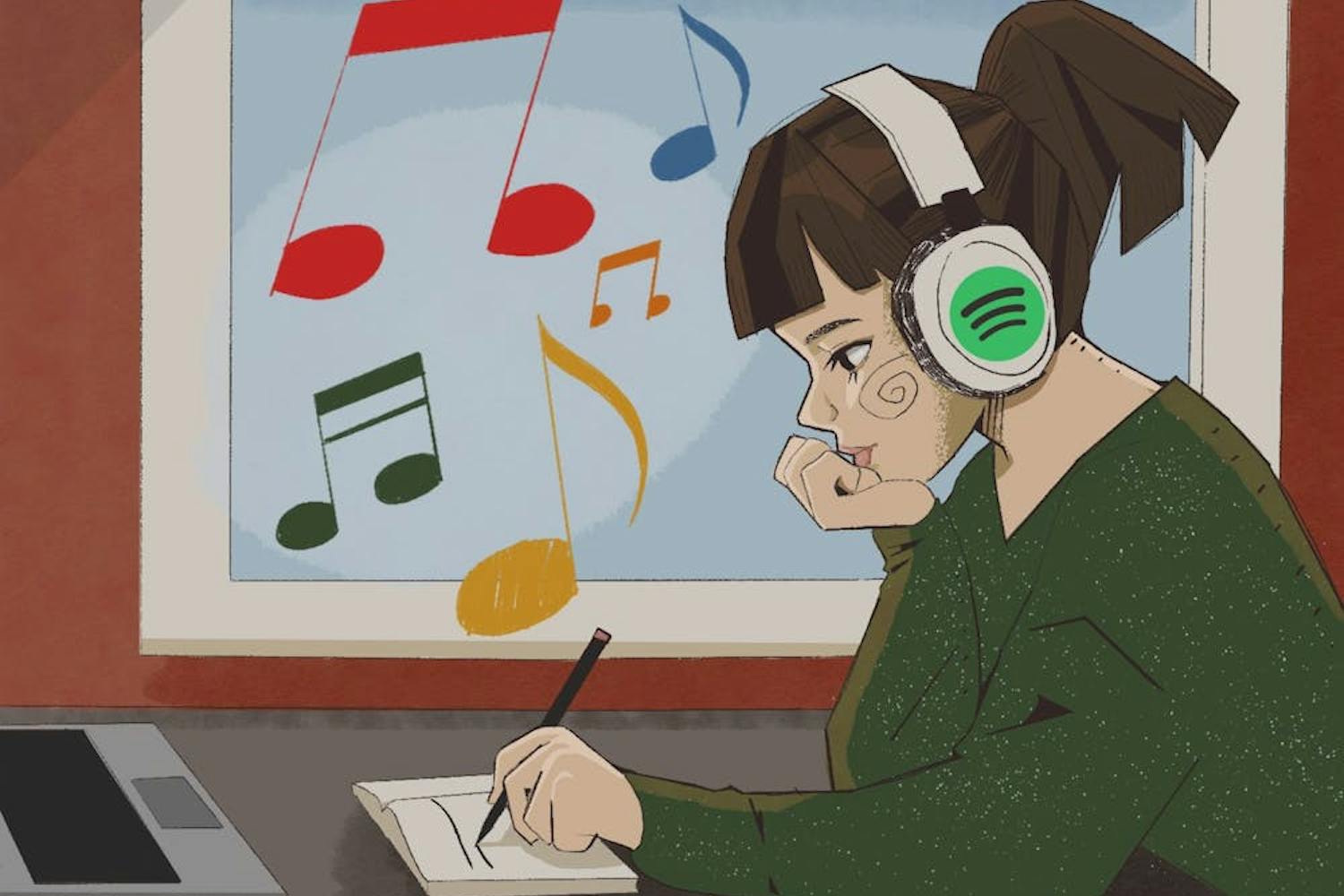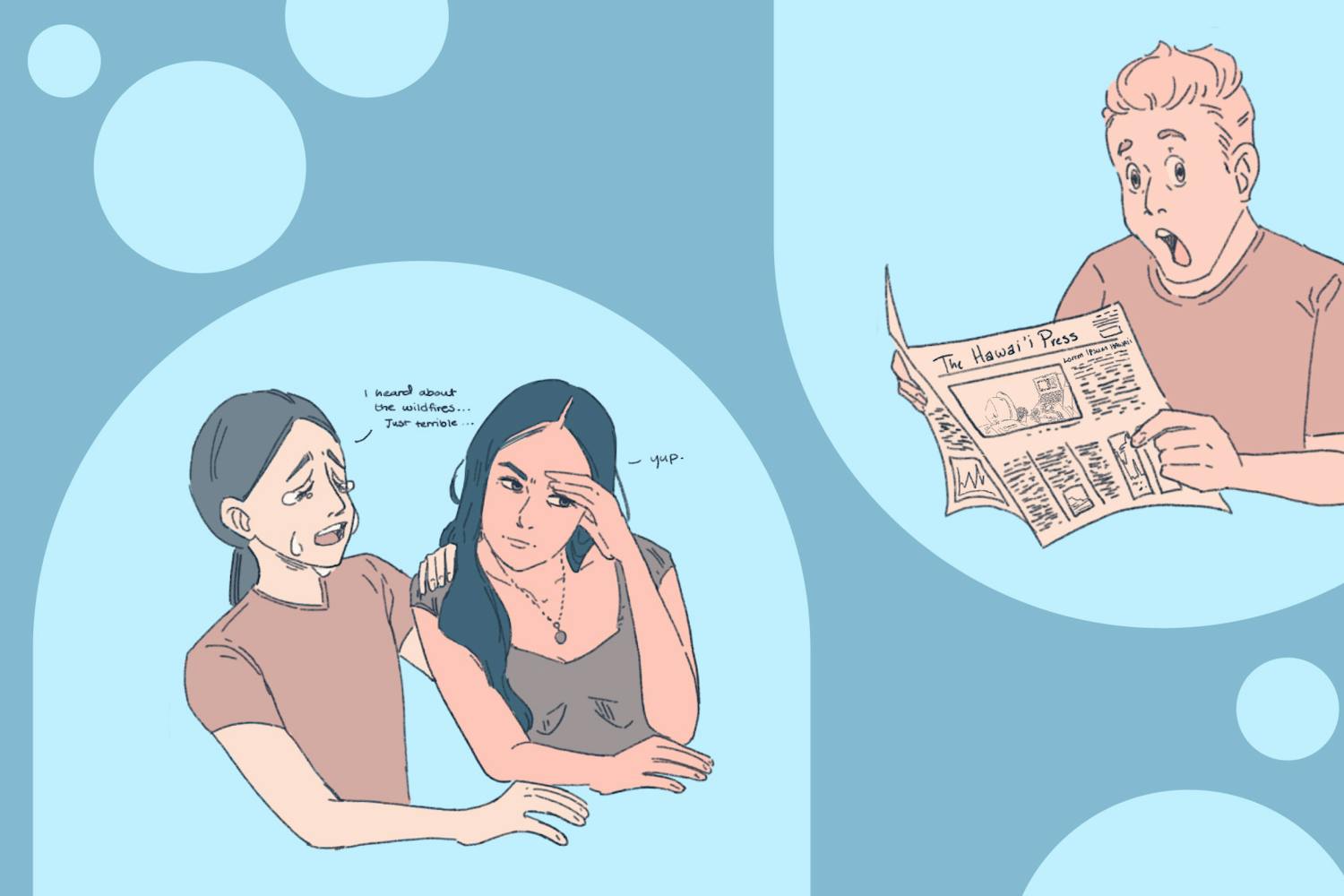 At the Center for Games & Impact's Innovation Lab, interns gather around to prototype a card game on gun policy while others take time to brush up on their gaming skills.
At the Center for Games & Impact's Innovation Lab, interns gather around to prototype a card game on gun policy while others take time to brush up on their gaming skills.Photo by Noemi Gonzalez
At the Center for Games & Impact’s Innovation Lab, interns gather around a table to play a game of what seems to be Blackjack at first glance. Each as of the six interns is dealt two cards by a dealer.
Cronkite alumna and Project Coordinator at the Center for Games & Impact Juli James stands at the head of the table.
She takes the role as the card dealer, but she also announces her role as analogous to the National Rifle Association (NRA), while the interns represent people who want to ban guns.
James explains the design of the card game to the interns and discusses how such a card game modeled after Blackjack and gambling will allow for conversation to arise about gun policies across the nation.
“What I’m trying to aim for is little meaningful changes that can have an impact,” James says.
 Taking norms of gambling to Blackjack, the interns work use the most basic to draw impact from.
Taking norms of gambling to Blackjack, the interns work use the most basic to draw impact from.Photo by Noemi Gonzalez
As soon as James says this, discussion ensues on how the game can be improved to better fit anti-gun lobbying and to better showcase the relationship between people and the NRA.
What the interns do at the Innovations Lab will be similar to the strategies students going for the Certificate in Games and Impact will be learning.
Starting in August 2013, students in any major field of study at ASU will have the opportunity to learn how video games and card games spread information. Students can tailor the certificate to fit their passion and their fields of study.
The certificate will allow students to explore how games — from the design to the music to the setting — can be used for entrepreneurial advances and social change.
Adam Ingram-Goble, who is a part of the Division of Education Leadership and Innovation at the Center, says games provide a way for players to put biases aside and learn about an issue from all angles.
“We’re not necessarily going to propose solutions in these games,” Ingram-Goble says. “I mean, that may happen, but it’s not the goal. This is actually just about developing the practice of playing with ideas and seeing what works and exploring new mechanics. That’s really what we’re looking to do here.”
The Center for Games & Impact focuses on three areas: investigation, innovation and cultivation.
By analyzing current video games, the Center also examines the development of games to determine their impact.
“We talk about impact on a lot of different levels,” says Elisabeth Hayes, a professor in the Department of English. “The most immediate level would be psychological or cognitive. But when we’re thinking about impact, we really want to encourage students to think beyond impact on individuals to the way that games have impact on groups, on organizations and even as society as a whole.”
 Partner Coordinator Juli James sits at the head of the table and discusses with interns how to improve the prototype.
Partner Coordinator Juli James sits at the head of the table and discusses with interns how to improve the prototype.Photo by Noemi Gonzalez
Hayes is currently pilot-testing a required course for the certificate, “Understanding Games for Impact.” Though it sounds like an English course, students analyze video games rather than literature.
The certificate primarily focuses on giving students hands-on learning where they will be required to play popular video games such as “Minecraft” and also the basic “Solitaire.”
In playing “Minecraft,” the building of an ocean and a rising sun out of blocks has become a possibility. Friends work together to create such a scene on their plasmas.
“Minecraft” along with other video games such as “Call of Duty” teach players teamwork and to think creatively beyond their own world. Interns and faculty at ASU’s Center for Games & Impact investigate, design and develop this effect.
“We’re talking about understanding what’s really motivating about games and how people learn through gaming itself,” Hayes says.
She says that the designs of games today replicate what society already knows, which she explains is an ineffective form of instruction in school when it comes to educational relevancy.
“What we’ll do is we’ll create software where kids, let’s say, solve math problems, and then they’ll get to blow up aliens as a reward,” Hayes says. “The trouble with that is that the learning part is still really boring. They’re still just solving math problems, and the game is sort of added on at the end as a reward.”
Hayes says her colleagues call this approach the chocolate covered broccoli approach.
“Broccoli is still broccoli,” Hayes adds. “You’re just dumping this outside layer on it in the hopes that people will kind of be deceived and eat the broccoli because they really want the chocolate. That’s not the kind of design that we’re talking about.”
The program is also designed to get students thinking of games as an educational tool for teachers, parents and players. Toward the end of the program, students will develop prototypes of games that target impact issues for their capstone project.
The Center for Games & Impact and the certificate focus on games that revolve around areas ranging from economic prosperity to public health to engaged-citizenship.
Director of Center for Games & Impact Sasha Barab says that what the Center for Games & Impact wants to do is help students studying in diverse fields such as sustainability or public policy begin to ask, “How can game design help them advance their goals?” When Barab arrived last year at ASU, he pitched the idea.
“We want to take that entertainment joy and put it towards some of the big missions undergrads have to change the world, and we’d really like them to think through how they can leverage games as part of doing that, accomplishing that goal,” Barab says.
Although open to all types of students, Barab says entrepreneurial students and students with a gaming background may really take advantage of the certificate.
“But it’s really targeted so that every student can tailor the certificate to work towards their goals within their field of study,” Barab says.
In March 2013, the News Media Innovation Lab alongside Center for Games & Impact hosted a news game development workshop at the Walter Cronkite School for Journalism and Mass Communication in order to encourage discussion about how games and video games can be tailored to explain complex news events.
 Students striving for the Games and Impact Certificate will be required to play video games to analyze the impact the game has on society.
Students striving for the Games and Impact Certificate will be required to play video games to analyze the impact the game has on society.Photo by Noemi Gonzalez
Business students can also use the certificate to develop a gaming system that will allow employees to be more involved and invested in their work, Barab says.
“We want to attract students from all sorts of different majors because that adds, really, to the value of the class discussion when people bring different perspectives and can share those with everyone else,” Hayes says. “That really enhances all of our understanding of how games are relevant to these different areas.”
Barab says the goal for the certificate started out with questioning how game designers can repurpose games to have a sustainable effect across the world: “Games are a medium for helping in inspiring participation and potentially social change.”
In an age where entertainment and social media are at a height in society, the gaming industry is elevating to a most influential level. The Center for Games & Impact’s certificate provides the bridging between an entertainment sector and an entrepreneurial underpinning.
Reach the writer at nagonza1@asu.edu or via Twitter @NoemiPossible




